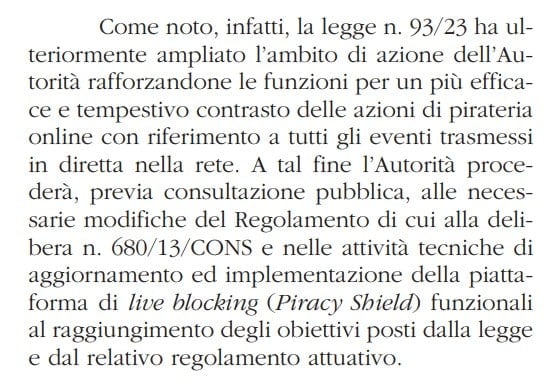 Less than a year has passed since Italy officially implemented the ‘Piracy Shield‘ system that aims to thwart live sports streaming piracy.
Less than a year has passed since Italy officially implemented the ‘Piracy Shield‘ system that aims to thwart live sports streaming piracy.
Since February the system has blocked access to thousands of IP-addresses and domain names associated with unauthorized broadcasts.
This massive blocking operation is seen as a major success by the authorities and many participating rightsholders. As time passed, however, its weaknesses also became painfully obvious.
In addition to effective blockades, there were multiple reports of overblocking, where the anti-piracy system blocked access to Google Drive, Cloudflare, and other legitimate sites and services. Meanwhile, calls for more transparency and accountability were growing.
Piracy Shield Expansion
The authorities haven’t been sitting still since the ‘Piracy Shield’ launch. In addition to technical tweaks and improvements, expanding its reach was of particular interest. In October, for example, an amendment was approved to compel VPNs and DNS services to comply with blocking orders too.
This expansion was unofficially confirmed at the Court of Milan which ruled that Cloudflare has to block Piracy Shield targets across all applicable services.
In the coming year, it’s expected that the ‘Piracy Shield’ legal framework (Law 93/23) will be further updated following a public consultation. AGCOM, the organization in charge of the blocking system, announced as much in its annual report last month.
“As known, in fact, Law No. 93/23 further expanded the scope of the Authority’s action by strengthening its functions for a more effective and timely countering of piracy actions online with reference to all events broadcast live on the network,” AGCOM wrote.
“To this end, the Authority will proceed, after public consultation, with the necessary amendments to the Regulations […] and with the technical activities of updating and implementing the live blocking platform (Piracy Shield) functionality to achieve the objectives set by the law.”

Piracy Shield for Movie Premieres?
AGCOM’s comments suggest that more sports and other live TV content may eventually receive ‘Piracy Shield’ protection. A public consultation is planned to discuss these and other potential expansions.
This is music to the ears of local anti-piracy group FAPAV, which represents major film organizations and companies, including Italian branches of Netflix, Universal, Warner Bros, and Walt Disney.
FAPAV President Bagnoli Rossi recently applauded AGCOM for the rollout of the ‘Piracy Shield’, describing it as a fundamental anti-piracy tool. At the same time, he expressed a wish to expand its scope even further, covering ‘non-live’ movies as well.
“We hope that the new public consultation will be opened as soon as possible, aimed at extending the timeliness of intervention to other audiovisual content provided for by law, including for example first-run films and non-sports live television broadcasts, a measure that the sector is waiting for,” Rossi says.
Slippery Slope?
Put differently, FAPAV would like to make the ‘Piracy Shield’ the defacto blocking standard for a wider variety of valuable copyrighted content.
This is not a trivial comment. It suggests that a 30-minute blocking window, which was written into law specifically to help protect rightsholders of live broadcasts, might be expanded to non-live content.
This is a controversial suggestion; ‘instant’ blockades are more susceptible to errors than measures ordered following a proper judicial review. While that may be acceptable collateral for live content, the stakes change when the same blocking technology is used more broadly.
While AGCOM hasn’t specifically mentioned the inclusion of non-live content, it’s clear that rightsholders will argue in favor of this during the upcoming consultation. That by itself, will be plenty of fuel for further discussion, controversy, and drama in 2025.
From: TF, for the latest news on copyright battles, piracy and more.
Powered by WPeMatico
